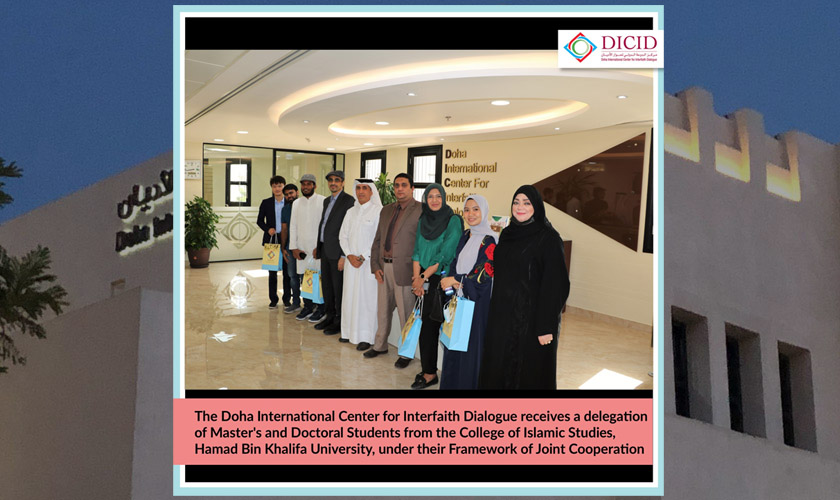
01 Nov DICID receives a delegation of Master’s and Doctoral Students from the College of Islamic Studies
On the morning of Wednesday, October 27, 2021, a delegation of students from the College of Islamic Studies at Hamad Bin Khalifa University visited the Doha International Center for Interfaith Dialogue. Professor Dr. Ibrahim Saleh Al-Naimi, Chairman of the Board of Directors of the Center and the Center’s employees received Dr. Josef W. Meri, Professor at the College of Islamic Studies at Hamad Bin Khalifa University, Ms. Sabika Shaban, Academic Journals and Publications Specialist at the College of Islamic Studies and five master’s and doctoral students in the field of interfaith dialogue.
This visit comes within the framework of the mutual visits of researchers from Hamad Bin Khalifa University and the Doha International Center for Interfaith Dialogue, which has a joint cooperation agreement with the College of Islamic Studies.
At the beginning of the meeting, Dr. Al-Naimi welcomed the visiting students and gave a brief presentation on the activities of the center, in which he referred to the most prominent activities, which are the Annual Doha International Interfaith Conference, which brings together those interested in the issue of interfaith dialogue, round tables for local communities, as well as the center’s publications, such as the specialized academic journal “Adyan”, in addition to training courses, seminars, and seasonal activities such as those related to national events.
The visit program included introducing visitors to the activities of the Doha International Center for Interfaith Dialogue, giving them an overview of the values of tolerance, coexistence and dialogue in the State of Qatar, and the center’s strategy aimed at making dialogue a permeating culture among all segments of Qatari society, whether citizens or residents, of all religions, races, and nationalities.
The visiting delegation was also briefed on a tour of the center’s library about the books and references available in it, which deal with diverse range of sciences related to dialogue and religions.
In his address, Dr. Ibrahim Saleh Al-Naimi said: “The center pays great attention to the youth sector, especially researchers, and we are keen to involve them in the center’s various activities and seminars. We publish their research in the international journal issued by the center – Adyan journal – under “The Role of Youth in Promoting the Values of Dialogue”, along with various round tables dealing with aspects related to youth, focusing on communities residing in Qatar, in which the youth represent a large segment.
In a statement by Dr. Josef Meri, the head of the delegation, and Professor at the College of Islamic Studies at Hamad Bin Khalifa University, on the importance of the visit, he said: “”The Doha International Centre for Interfaith Dialogue (DICID) under the astute leadership of Prof. Ibrahim Al Naimi has emerged as one of the world’s leading interfaith organizations. My students and I were honoured to visit the Centre and hear about its past and present. The College of Islamic Studies, Hamad Bin Khalifa University looks forward to further collaboration with DICID and enhancing opportunities for students in Qatar and abroad.””
For their part, the visiting student delegation commended the center’s efforts in consolidating the values of coexistence and dialogue between religions and cultures at the local and international levels.
Academic Journals and Publications Specialist and Student, Ms. Sabika Shaban (Canada) said: “It was remarkable to know the breadth and depth of the various initiatives and projects being conducted in the interfaith space, both academically as well as on the ground with local communities in Qatar.”
While Nuh MaHao “China” (PhD student college of humanities & social sciences – hamad bin khalifa university /) added: “[We live] in a multi-religious world, where inter-religious interaction is dramatically increasing, particularly in developed and developing cities, where religious communities are less isolated. Against this background interfaith dialogue is more important [for better understanding] the religious ideas and practices of others and is one of the decisive factors [for] adherents of different religions to live with each other harmoniously. This doesn’t mean accepting others’ religious tenets as one’s own…but accepting and respecting others as fellow human beings.”
Bai Honey Kasan Demalon (Philippines) added: ” Although the visit was short, we learned a lot about the Center. He spoke to us about the history of DICID and its founding. He also shared with us information about Center events, activities, programs, and conferences and invited us to join and participate in the upcoming 2022 conference. This visit was helpful since I am doing a thesis on the interfaith relation between Muslims and Christians in the Philippines that focuses on tolerance and coexistence.”
Mohammed Asaf (India) said: “We learned about the organization’s interventions in interfaith dialogue to promote harmony and coexistence among religious communities in Qatar. Dr. Naimi’s talk was very informative and stimulating in this regard”
Finally, Muhammad Ramadan (India) added: ” Our visit to DICID was memorable. Dr. Ibrahim al-Naimi’s talk gave me a good sense about the significance of interfaith engagements in this globalized world. I am very excited to attend the upcoming Doha conference.”



Sorry, the comment form is closed at this time.